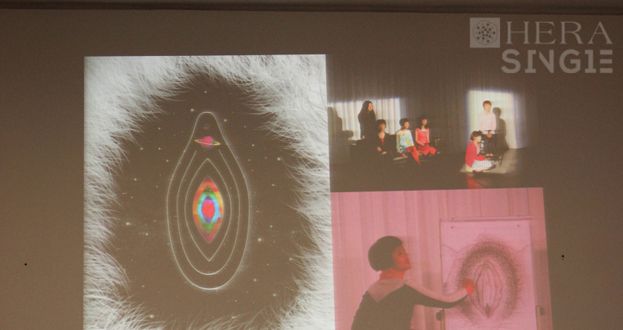
On 5 December 2014, Shanghainese feminist activists Wu Xiaoyan and Cai Luoyi gave a lecture about Vagina Monologues adaptions in China.
In 1996, the Vagina Monologues (VM), an episodic play written by Eve Ensler, was first performed in the Off Broadway Westside Theatre after a limited run at HERE Arts Center in New York City. Since its first Chinese adaptation in 2003 the play has been performed countless times throughout China, becoming representative of the country’s feminist theatre. In their presentation at the “Precariously Yours” workshop, the Shanghainese feminist activists Wu Xiaoyan and Cai Luoyi, described how most of the VM adaptations are performed non-commercially by student drama clubs in universities and grass-roots organisations. While retaining the original’s form of monologues as well as its feminist spirit, the plays are strongly localised drawing on real life stories experienced by Chinese women from different classes and backgrounds. Furthermore, accounts contributed by LGBT people are added to the plays in order to raise public awareness on gender and sexual minorities.
Focusing on the production history of VM in Beijing, Shanghai and Guangzhou Wu and Cai’s presentation outlined the process of localisation of the play and its role in Chinese gender and theatre movements. In 2003, the Gender Education Forum at Sun Yat-sen University in Guangzhou performed the first Chinese version of Vagina Monologues. Whereas in its early stages most scripts were translated from the original English version, the later performances of localised VM called, For Vagina’s Sake, were scripted almost entirely in reference to local social issues. In Shanghai, VM was first adapted and performed by Zhihe She (知和社), a students’ gender study club at Fudan University, ten years ago. In the past decade, more versions of localised VM have been performed at different universities. In 2012, the feminist organisation “Beaver Drama Club” (named after the nickname of Simone Beauvoir), was founded and soon launched three performances of a new version of VM named Yindao Duoyun, which received heated responses. In Beijing, the Media Monitor for Women Network (妇女传媒监测网络, a feminist NGO) meanwhile formed a new feminist advocacy group named Bcome (“B” is a homophone for “pussy/vagina” in Chinese) and started to create other scripts for China’s VM. Its version named “The Dao of Vagina” (The Ways/Taoism of Vagina), has been performed regularly since 2013.
For Wu and Cai, the localisation of VM in China offers proof of the feminist drama’s influential role in motivating China’s gender movements in three ways. Firstly in an individual sense, numerous mostly educated, middle class and young Chinese women joined performances of VM, which allowed them to further explore feminist thought. Some of them even felt motivated to become dominant forces in the promotion of feminism in China and organised public campaigns. For instance some activists involved in VM staged their intervention in metro compartments throughout Shanghai. They adopted the slogan “I CAN be Slutty, You CANNOT Harass”, with which they sought to fight against sexual harassment in public, simultaneously forcing the issue of victim blaming into the public arena and highlighting women’s bodily integrity and autonomy. Secondly on a community level, China’s adaptations create an important channel for different groups to make their voices heard by enabling open public discussion on the topics of homosexuality, transgender, sex work and female migrant labours. VM could thereby serve as the first platform for Chinese lesbian communities and feminist gender movements to intersect. Finally, in regards to its role within Chinese society, the VM adaptations have become influential media communicating gender education and feminist practices to the general public. In this way VM contributes to the visibility of feminist content in public and works against a lack of representation or demonisation of feminism in China.
Even though Chinese feminists have been incredibly active in promoting feminism and women’s rights, the country’s social movements find it difficult to gain public traction on account of its current political system. Situating VM as an artistic expression, hence, helps feminists to navigate political risks and enables them to diversify the local gender movements in the face of restrictive and patriarchal state regulations. The VM adaptations’ strong commitment to localisation and its direct engagement with women’s sexual autonomy furthermore contribute to a new language, which not only reframes sexuality in terms of pleasure and sexual expression but also counteracts the marginalisation of sexual minorities. As such these performances emerge as important techniques of resistance and critique challenging dominant accounts of femininity as well as any stigmatisation of female sexuality in contemporary Chinese society.